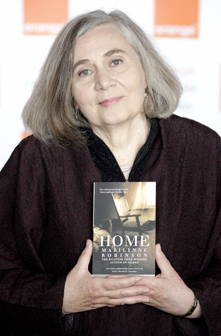HOME
A Novel by Marilynne Robinson
with a study guide by Lee Magness

MARILYNNE ROBINSON, HOME
A Reading and Study Guide
"Robinson...chose the parable of the Prodigal Son on which to base the novel because it is a story about love—about the fact that love is not earned." (NPR)
Marilynne Robinson is a thoughtful contemporary novelist. Her first novel, Housekeeping, was nominated for the Pulitzer Prize for Fiction; her second, Gilead, won the Pulitzer; and her third novel, Home, has received numerous awards. Most remarkably, Robinson has received this acclaim from critics and the reading public while filling her novels with Christian characters and themes. As the title hints, Home, touches on themes shared with the parable of the Prodigal Son. Use these suggestions and questions to guide your reading, then return to them as you reflect on your reading.
1) Track the following themes which pervade the novel as well as the parable:
Lostness/Seeking/Finding
Coming home/homecoming
Change/Predestination/Restoration
Grace/forgiveness/works
Dead/alive
2) Study the main characters and consider their relationship to the characters in the parable:
How is Jack like and not like the younger son in the parable? What is Jack's underlying sin/flaw?
Is Rev. Boughton the father in the parable or the elder son or both? What is Rev. his underlying sin/flaw?
Is Glory the elder son in the parable or the father or both? Does Glory have a sin/flaw?
3) Notice the symbols in the novel and think about their significance:
the house, meals, the television, baseball, the moth, the oak tree, the barn, the car, others?
4) Foreshadowing is a powerful literary device. Notice how Jack's interest in letters and phone calls and the news
stories on the television foreshadow a major development at the end of the novel. Is there any foreshadowing
in the very simple narrative of the parable of the Prodigal Son?
5) How are the following pivotal moments characterized by both transcendence and tragedy?
visiting the baby (56); watching television (96-97); the first car ride (163); visiting Ames' church (206f); the gift of
morels (270f); Jack's last day (309)
6) The Boughton girls are named Faith, Hope, and Glory. Is there any significance in the fact that one of them was
not named Charity (Love)?
7) What is the role of race in this novel and does it have any relationship with the parable?
8) What are some of your favorite quotes from the novel?
A Reading and Study Guide
"Robinson...chose the parable of the Prodigal Son on which to base the novel because it is a story about love—about the fact that love is not earned." (NPR)
Marilynne Robinson is a thoughtful contemporary novelist. Her first novel, Housekeeping, was nominated for the Pulitzer Prize for Fiction; her second, Gilead, won the Pulitzer; and her third novel, Home, has received numerous awards. Most remarkably, Robinson has received this acclaim from critics and the reading public while filling her novels with Christian characters and themes. As the title hints, Home, touches on themes shared with the parable of the Prodigal Son. Use these suggestions and questions to guide your reading, then return to them as you reflect on your reading.
1) Track the following themes which pervade the novel as well as the parable:
Lostness/Seeking/Finding
Coming home/homecoming
Change/Predestination/Restoration
Grace/forgiveness/works
Dead/alive
2) Study the main characters and consider their relationship to the characters in the parable:
How is Jack like and not like the younger son in the parable? What is Jack's underlying sin/flaw?
Is Rev. Boughton the father in the parable or the elder son or both? What is Rev. his underlying sin/flaw?
Is Glory the elder son in the parable or the father or both? Does Glory have a sin/flaw?
3) Notice the symbols in the novel and think about their significance:
the house, meals, the television, baseball, the moth, the oak tree, the barn, the car, others?
4) Foreshadowing is a powerful literary device. Notice how Jack's interest in letters and phone calls and the news
stories on the television foreshadow a major development at the end of the novel. Is there any foreshadowing
in the very simple narrative of the parable of the Prodigal Son?
5) How are the following pivotal moments characterized by both transcendence and tragedy?
visiting the baby (56); watching television (96-97); the first car ride (163); visiting Ames' church (206f); the gift of
morels (270f); Jack's last day (309)
6) The Boughton girls are named Faith, Hope, and Glory. Is there any significance in the fact that one of them was
not named Charity (Love)?
7) What is the role of race in this novel and does it have any relationship with the parable?
8) What are some of your favorite quotes from the novel?
